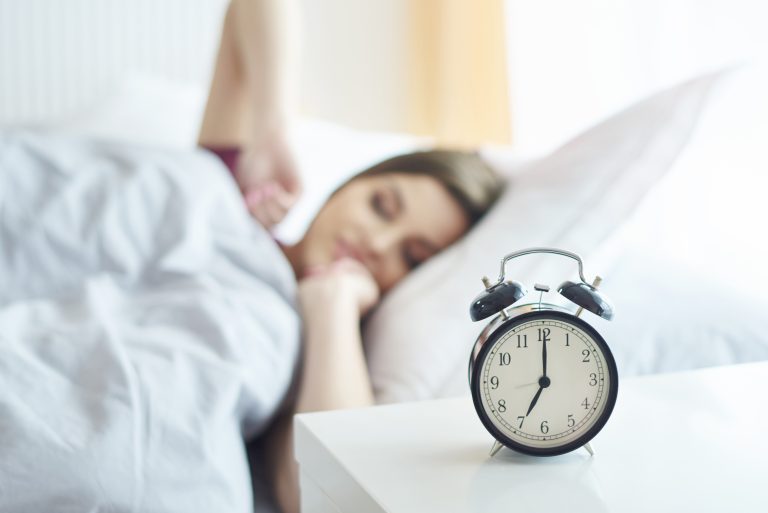
Just as each individual possesses a unique personality, behaviour and characteristics that distinguish them from others, so do our natural rhythms. This is why you’ll notice how some people are full of energy in the morning while others come alive at night. These rhythms which define our internal clocks are known as “chronotypes”. In this article, we’ll dive into understanding the concept of chronotype and explore the distinctive characteristics of the four sleep chronotypes, which are key to enhancing productivity and improving overall well-being.
What is a Chronotype?
At its core, a Chronotype represents our body’s innate tendency towards a specific sleep-wake time, as well as levels of activeness, alertness and rest rhythms over a 24-hour cycle, usually rooted in the timing of our circadian rhythms. You can think of it as a personalised body clock that tells you whether you’re inclined to be an early riser or a night owl.
Furthermore, emerging studies reveal that chronotype is strongly associated with a circadian clock gene called PER3. Sleep expert Dr. Michael Breus stated in an interview that individuals with a longer PER3 gene are inclined to be early risers and require at least 7 hours of sleep. Whereas those with a shorter PER3 gene tend to be late risers who can function well on less sleep. Moreover, some researchers hypothesise that the diversity of chronotypes may have evolved as a survival technique among early hunter-gatherers. This concept suggests that by taking turns in their sleep, a group could make sure there’s always someone awake and vigilant.
What Are The 4 Chronotypes?
Experts have come up with several ways of classifying chronotypes, with one of the most widely known classifications introduced by Dr. Michael Breus, who identified four main chronotype categories. These categories are loosely based on the sleep patterns and habits of various animals.
The Bear Chronotype
Studies reveal that approximately 55% of the population falls into the bear chronotype, making it the most common among the rest. Bears follow a solar-based schedule, which means that people with this chronotype normally wake up when the sun rises and begin to feel sleepy as the sun sets. The usual sleep duration for bears is eight hours, which typically starts from 11 p.m. until 7 a.m. As for productivity levels, bears experience a peak in energy and focus in the late morning through early afternoon, which declines as late afternoon approaches. This makes the bear chronotype perfect for a typical 9-5 work schedule.
Here’s a glimpse into the schedule of a bear chronotype:
- 7 a.m. to 8 a.m. – Wake up
- 10 a.m. to 2 p.m. – Peak focus time for energy-demanding tasks
- 3 p.m. to 6 p.m. – Downtime; best hours to switch to completing lighter tasks
- 6 p.m. to 9 p.m. – Prepare for sleep; start bedtime routine
- 11 p.m. – Bedtime
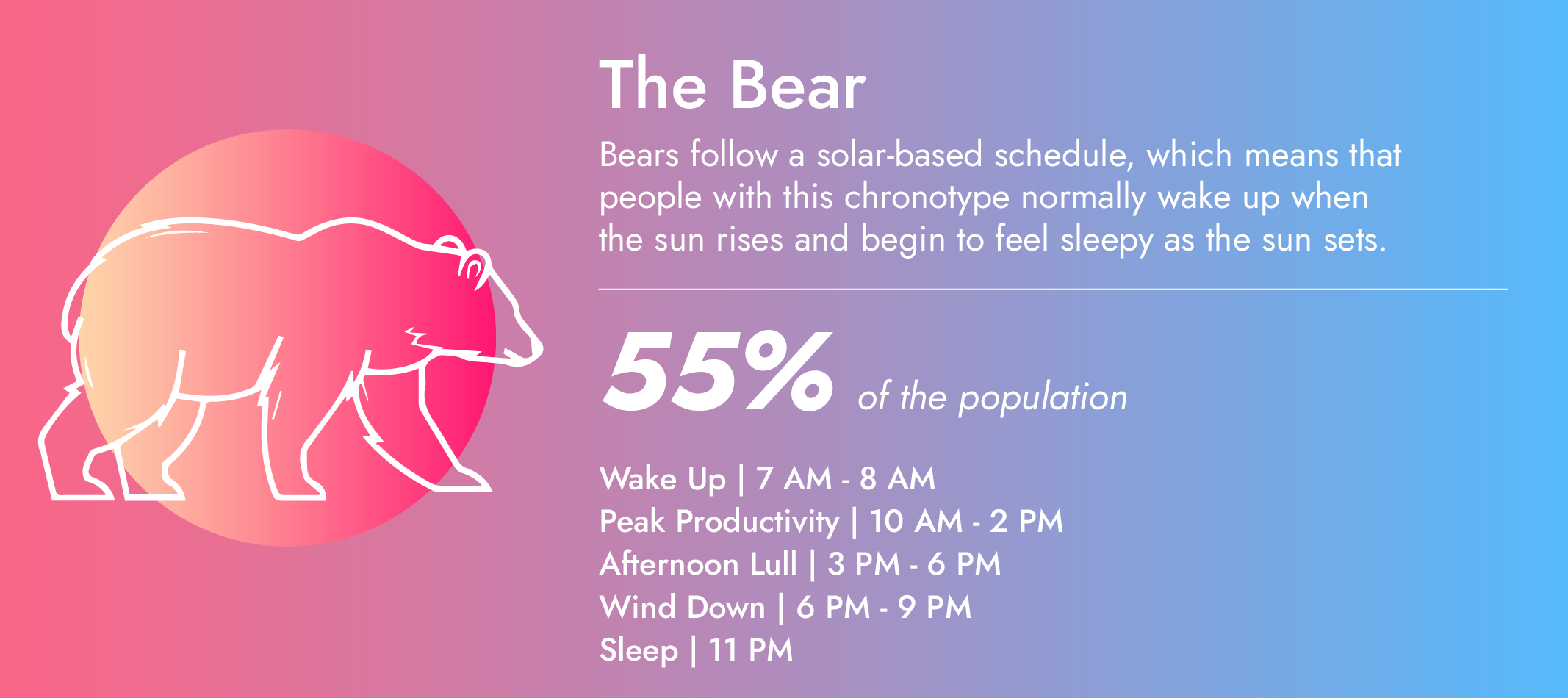

The Lion Chronotype
Lions, also known as the ‘early risers’ or ‘early birds’, tend to experience high productivity and energy early in the morning before anybody else wakes up. For others, waking up before 7 a.m. is never a personal choice (unless work or school requires them to). On the other hand, individuals who fit into the Lion chronotype naturally choose to wake up early. Studies show that about 10% to 20% of the population falls into this chronotype. However, given the fact that lions rise early, they also tend to snooze early, typically falling asleep between 9 p.m. and 10 p.m.
Below is a snapshot of a lion’s daily schedule:
- 5:30 a.m. to 6 a.m. – Wake up
- 8 a.m. to 12 p.m. – Peak focus time for energy-demanding tasks
- 12 p.m. to 3 p.m. – Downtime; best hours to switch to completing lighter tasks
- 6 p.m. to 9 p.m. – Prepare for sleep; start bedtime routine
- 9 p.m. to 10 p.m – Bedtime
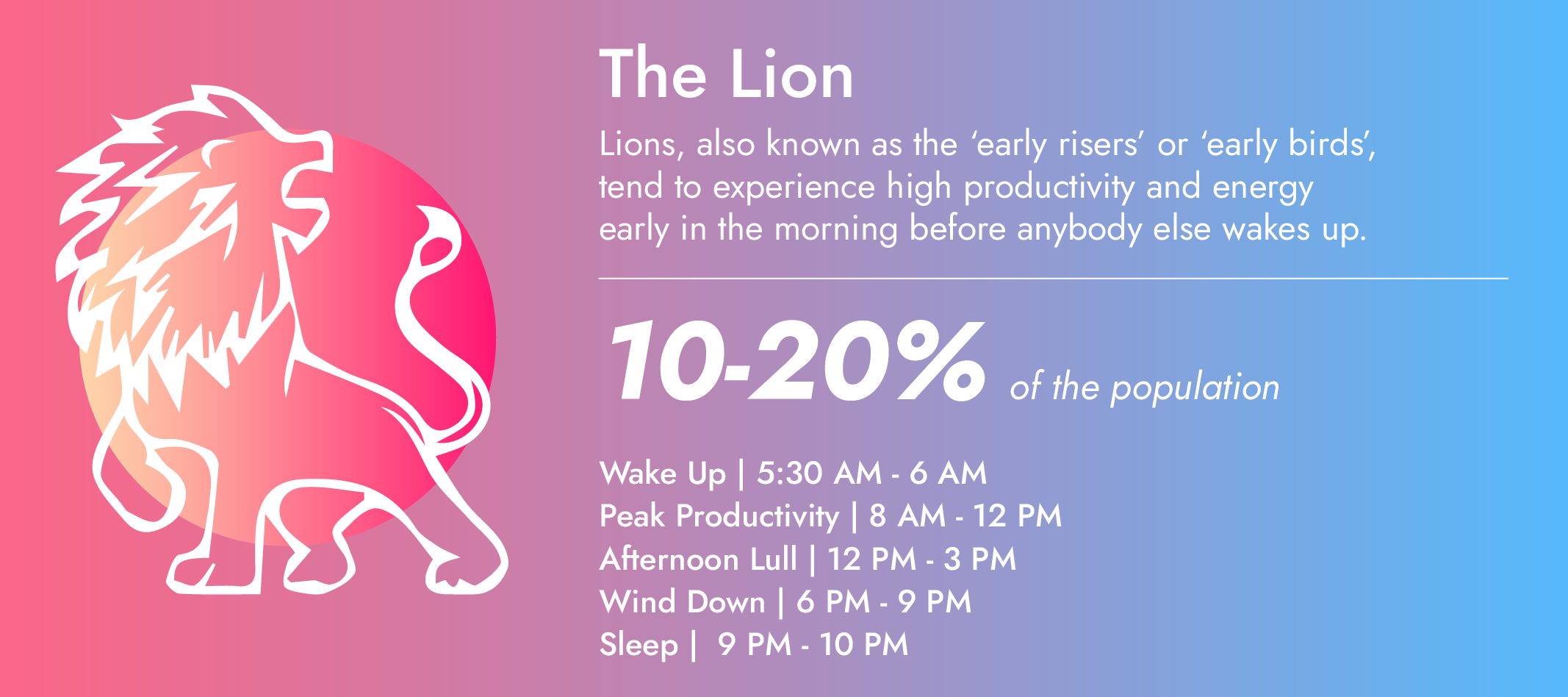

The Wolf Chronotype
Individuals who fit the wolf chronotype are also described as “night owls”. Much like how wolves are most active at dusk and dawn, individuals with this chronotype are also more active during the latter part of the day. Moreover, because wolves typically go to bed late, they also find it difficult to wake up early in the morning, leading them to start their day a bit later than others. According to research, around 15% of the population are wolf chronotypes.
A typical schedule of a wolf chronotype may look like this:
- 7:30 a.m. to 9 a.m. – Wake up
- 10 a.m. to 12 p.m. – Warm up; best hours to complete light tasks
- 12 p.m. to 9 p.m. – Peak focus time for energy-demanding tasks
- 9 p.m. to 12 a.m. – Prepare for sleep; start bedtime routine
- 12 a.m. or later – Bedtime
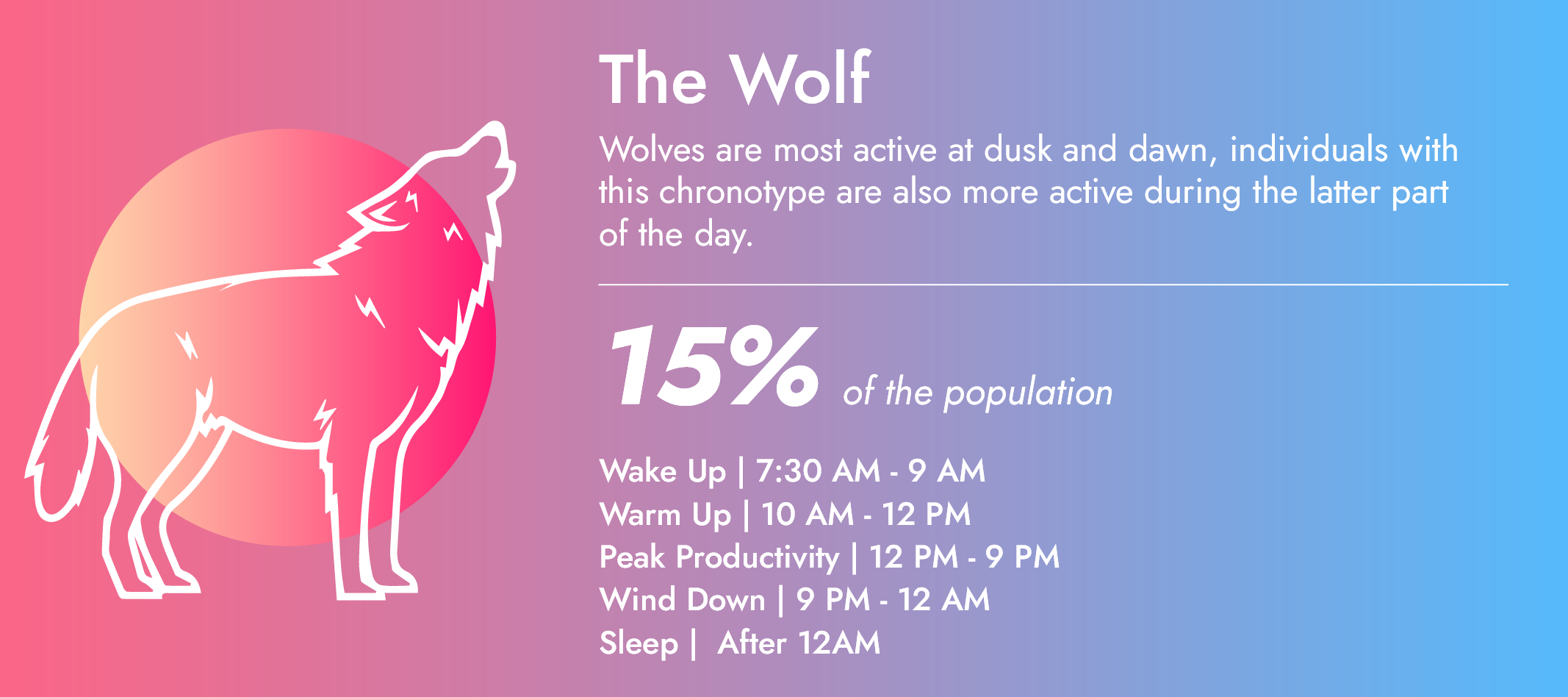

The Dolphin Chronotype
With approximately 10% of the population falling into this rare chronotype, these people are more prone to insomnia. These individuals are comparable to dolphins, who sleep only with half their brains alert. People with a dolphin chronotype are light sleepers; they have trouble falling and staying asleep and are easily disturbed by the slightest noise, movement or changes in temperature. As a result, dolphins tend to have irregular sleep schedules and often wake up feeling foggy. It may also take some time for these people to “warm up” and get started with their day.
The daily schedule of a typical dolphin chronotype may look like this:
- 6:30 a.m. to 7 a.m. – Wake up
- 10 a.m. to 12 p.m. – Peak focus time for energy-demanding tasks
- 12 p.m. to 4 p.m. – Downtime; best hours to switch to completing lighter tasks
- 4 p.m. to 10 p.m. – Prepare for sleep; start bedtime routine
- 12 a.m. or later – Bedtime
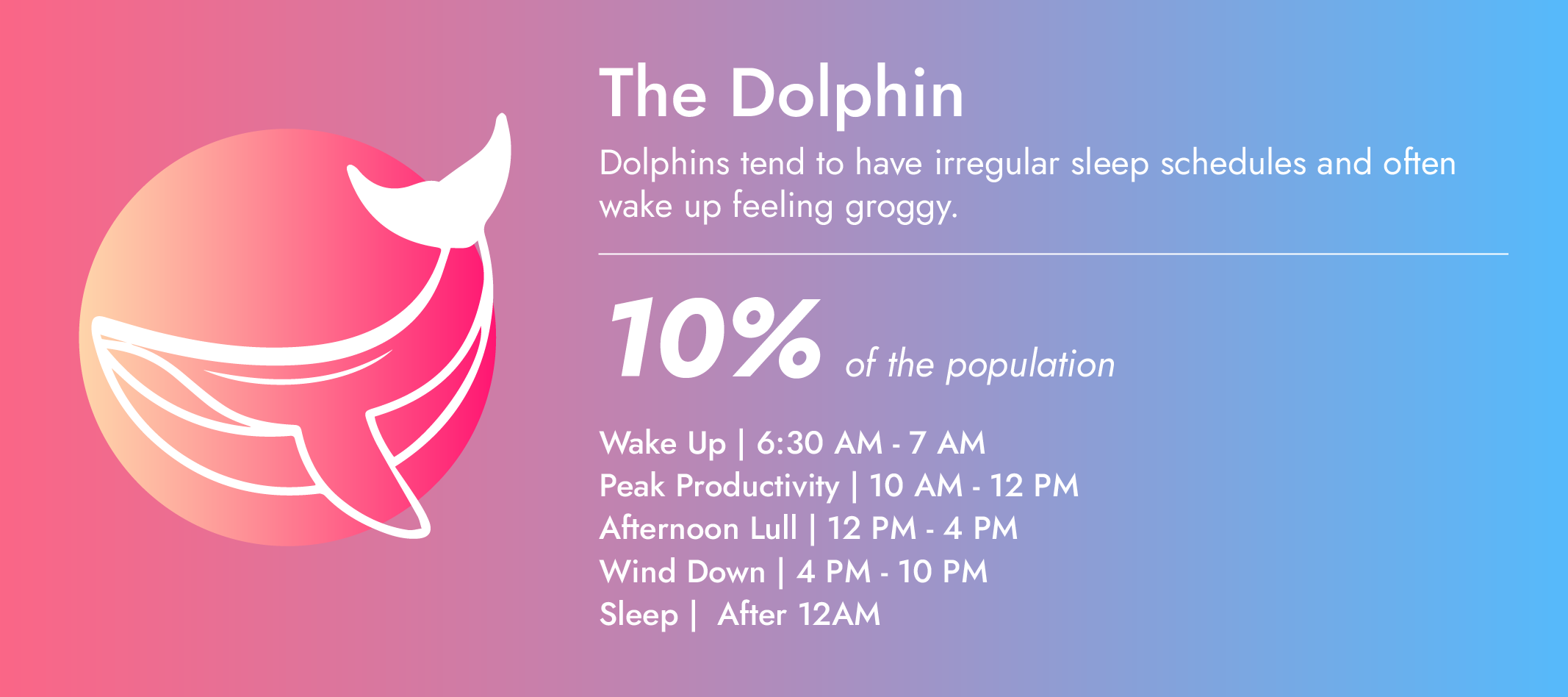

What is My Chronotype?
After reading about the concept and different types of chronotypes, you may feel like you know more but at the same time, more curious — and that’s a good thing! If you’re determined to improve your routine to match your chronotype and want some extra guidance, you can try out the popular chronotype quiz created by Dr. Michael Breus.
Understanding your chronotype is like unlocking a personal secret that can help you optimise your productivity, sleep, and overall well-being. If you’re ready to take the next step and ensure your sleep matches your chronotype, we invite you to take our mattress selector quiz to help you find the perfect mattress tailored to your needs and preferences. Don’t forget to explore our diverse range of mattresses designed to provide you with the best possible sleep experience. Here’s to a healthier, happier, and more well-rested you!



